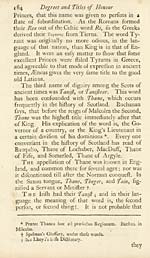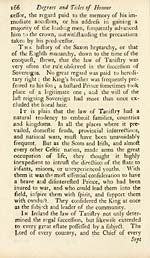Blair Collection > Critical dissertations on the origin, antiquities, language, government, manners, and religion, of the antient Caledonians, their posterity the Picts, and the British and Irish Scots
(203)
Download files
Complete book:
Individual page:
Thumbnail gallery: Grid view | List view

among the ancient Scots. 1^5
they borrowed the title from the Englifli, as, not~
withftanding of Bede's allegation concerning the
friendly difpofition of the Irilli towards the Saxons
of the fixth and feventh centuries, they had a
mortal averfion to the Englilli -, and before the
conqueft of Ireland by Henry the Second, the title
of Tanift became obfolete : it may therefore be
prefumed that Tanifl is an ancient Galic woid.
I N the fettlement of fuccelT;on, the law of
Tanifl ry prevailed in Ireland from the earlieft ac-
counts of time. " According to that law, fays
Sir James Ware *, the hereditary right of fuccef-
fion was not maintained among the Princes or the
Rulers of countries ; but the ftrongefl:, or he who
had moft followers, very often the eldeft and moft
worthy of the deceafed King's blood and name,
fucceeded him. This perfon, by the common
fufFrage of the people, and in the lifetime of his
predeceffor, was appointed to fucceed, and v/as
called Tanifl, that is to fay, the fecond in dignity.
Whoever received this dignity, maintained him-
felf and followers, partly out of certain lands fet
apart for that purpofe, but chiefly out of tributary
impofitions, which he exacted in an arbitra-
ry manner; impofitions, from which the lands
of the church only, and tliofe of perfons veiled
with particular immunities, were exempted."
The fame cuftom was a fundamental law in
Scotland tor many ages. Upon the death of a
King, the throne was not generally filled by his
fon, or daughter failing of male iflue, but by liis
brother, uncle, coufin-german, or near relation of
the fame blood. The perfonal merit of the luc-
* Antiq, and Hift. of Ireland, cbap. 8.
L 3 ceflbr,
they borrowed the title from the Englifli, as, not~
withftanding of Bede's allegation concerning the
friendly difpofition of the Irilli towards the Saxons
of the fixth and feventh centuries, they had a
mortal averfion to the Englilli -, and before the
conqueft of Ireland by Henry the Second, the title
of Tanift became obfolete : it may therefore be
prefumed that Tanifl is an ancient Galic woid.
I N the fettlement of fuccelT;on, the law of
Tanifl ry prevailed in Ireland from the earlieft ac-
counts of time. " According to that law, fays
Sir James Ware *, the hereditary right of fuccef-
fion was not maintained among the Princes or the
Rulers of countries ; but the ftrongefl:, or he who
had moft followers, very often the eldeft and moft
worthy of the deceafed King's blood and name,
fucceeded him. This perfon, by the common
fufFrage of the people, and in the lifetime of his
predeceffor, was appointed to fucceed, and v/as
called Tanifl, that is to fay, the fecond in dignity.
Whoever received this dignity, maintained him-
felf and followers, partly out of certain lands fet
apart for that purpofe, but chiefly out of tributary
impofitions, which he exacted in an arbitra-
ry manner; impofitions, from which the lands
of the church only, and tliofe of perfons veiled
with particular immunities, were exempted."
The fame cuftom was a fundamental law in
Scotland tor many ages. Upon the death of a
King, the throne was not generally filled by his
fon, or daughter failing of male iflue, but by liis
brother, uncle, coufin-german, or near relation of
the fame blood. The perfonal merit of the luc-
* Antiq, and Hift. of Ireland, cbap. 8.
L 3 ceflbr,
Set display mode to: Large image | Transcription
Images and transcriptions on this page, including medium image downloads, may be used under the Creative Commons Attribution 4.0 International Licence unless otherwise stated. ![]()
| Permanent URL | https://digital.nls.uk/76288844 |
|---|
| Description | A selection of books from a collection of more than 500 titles, mostly on religious and literary topics. Also includes some material dealing with other Celtic languages and societies. Collection created towards the end of the 19th century by Lady Evelyn Stewart Murray. |
|---|
| Description | Selected items from five 'Special and Named Printed Collections'. Includes books in Gaelic and other Celtic languages, works about the Gaels, their languages, literature, culture and history. |
|---|

